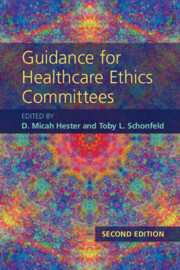Book contents
- Guidance for Healthcare Ethics Committees
- Guidance for Healthcare Ethics Committees
- Copyright page
- Dedication
- Contents
- Contributors
- Preface
- Section 1 The Context of Healthcare Ethics Committee Work
- Section 2 Consultation
- Chapter 7 Ethics Consultation Mission, Vision, Goals, and Process
- Chapter 8 A Method of Consultation
- Chapter 9 Informed Consent
- Chapter 10 Confidentiality and Privacy
- Chapter 11 Decision-Making Capacity
- Chapter 12 Discharge Challenges
- Chapter 13 Surrogate Decision Making
- Chapter 14 Advance Care Planning and End-of-Life Decision-Making
- Chapter 15 Potentially Inappropriate Treatment and Medical Futility
- Chapter 16 Cognitive Dissonance and the Care of Patients with Disorders of Consciousness
- Chapter 17 Ethical Issues in Reproduction
- Chapter 18 Ethical Issues in Neonatology
- Chapter 19 Ethical Issues in Pediatrics
- Chapter 20 Neuroethics
- Chapter 21 Ethical Issues in Clinical Genetics
- Chapter 22 Challenging Issues in Surgical Ethics
- Chapter 23 Psychiatric Ethics
- Section 3 Policy Development and Organizational Issues
- Index
- References
Chapter 13 - Surrogate Decision Making
from Section 2 - Consultation
Published online by Cambridge University Press: 17 February 2022
- Guidance for Healthcare Ethics Committees
- Guidance for Healthcare Ethics Committees
- Copyright page
- Dedication
- Contents
- Contributors
- Preface
- Section 1 The Context of Healthcare Ethics Committee Work
- Section 2 Consultation
- Chapter 7 Ethics Consultation Mission, Vision, Goals, and Process
- Chapter 8 A Method of Consultation
- Chapter 9 Informed Consent
- Chapter 10 Confidentiality and Privacy
- Chapter 11 Decision-Making Capacity
- Chapter 12 Discharge Challenges
- Chapter 13 Surrogate Decision Making
- Chapter 14 Advance Care Planning and End-of-Life Decision-Making
- Chapter 15 Potentially Inappropriate Treatment and Medical Futility
- Chapter 16 Cognitive Dissonance and the Care of Patients with Disorders of Consciousness
- Chapter 17 Ethical Issues in Reproduction
- Chapter 18 Ethical Issues in Neonatology
- Chapter 19 Ethical Issues in Pediatrics
- Chapter 20 Neuroethics
- Chapter 21 Ethical Issues in Clinical Genetics
- Chapter 22 Challenging Issues in Surgical Ethics
- Chapter 23 Psychiatric Ethics
- Section 3 Policy Development and Organizational Issues
- Index
- References
Summary
Mrs. McGuire’s situation is common. Estimates suggest about 40% of adult hospitalized patients and residential hospice patients lack decisional capacity, necessitating that someone be identified to make medical decisions for them (DeMartino et al., 2017). Choosing the right person for this job can be complicated. Healthcare providers (HCPs) will know what therapies or interventions may be possible for a given condition but are unlikely to know what the patient would choose based on their values, goals, and priorities. And in a case like Mrs. McGuire’s, where there are multiple adult children variously involved in her care, it is also difficult to know whom to ask to get this information. This compounding of uncertainty – what the patient would choose and who should make decisions when they cannot – serves as the foundation for the concept of norms governing surrogate decision-making.
- Type
- Chapter
- Information
- Guidance for Healthcare Ethics Committees , pp. 113 - 120Publisher: Cambridge University PressPrint publication year: 2022



